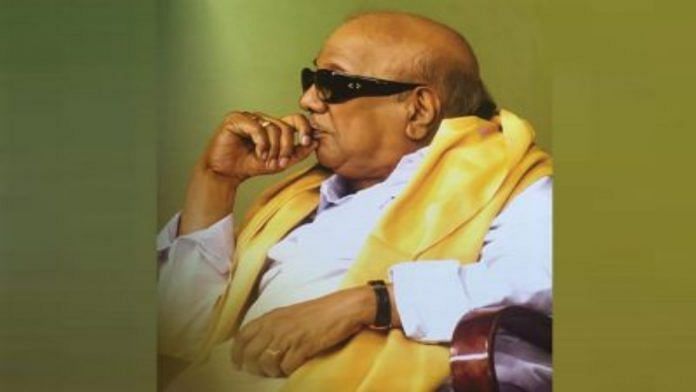A special salute to the melodic force Haneefa, whose music has resounded from the beginning without summons, and continues to echo powerfully today. And to my dearest comrades—those indelibly etched in my heart, dearer to me than life itself—I offer my deepest respects.
In this poetic gathering in Anna’s name, poets have arrived, drawing inspiration from his legacy. Like fruit-bearing trees, they have brought verses that time itself cannot erode—sculpting the glories of Tamil in enduring stone. The Kalaivanar stage has transformed into a poetic sanctuary.
Yet amidst this celebration, I catch the mocking laughter of a few. “What purpose does a poetry forum serve the movement?” they scoff. “Isn’t it shameful to conduct such a spectacle?” they ask.
But look—here we stand, victorious, brandishing the sword of valour, and they still ask why we celebrate.
Let me share a parable, one for both them and you:
A thief who sneaks into a home by extinguishing the lamp steals quietly and runs without trace. Similarly, they boast of victories in Aruppukottai and Nellai.
Did I not say before? In this regime ruled by deceit, we must neither desire nor seek by-elections. Still, as my fellow warriors insisted without hesitation, to fall in battle and bear noble scars is a mark of honor.
Our democratic army rose and clashed against their mercenary forces. And though we may have fallen, the wounds we bear are badges of valor.
When the noble Ramachandran felled Vali from hiding, even the great poet Kamban hesitated to hail him a hero. For Vali, though struck down, claimed a moral victory in death. Sugriva, who ruled afterward, lived with the stain of betrayal.
So, even in defeat, those who bear virtuous wounds are the ones remembered as heroes.
A Tamil bows not in shame, nor lowers their head in defeat. We are a people who honour our parents with deep gratitude. For Tamils, Anna is a mother; Periyar, a father. And our movement, their child, has never forgotten this debt.
Today, even the laughter born from our wounds lights the path to future triumphs.
Last night, I lay in bed, memories of the school in Erode and the green campus of Kanchi College flooding me with longing. As I sighed, a figure came close and embraced me with no trace of hesitation. I didn’t push her away, nor did I draw her near. I simply let her be.
Then came another—she, a rainbow-player of dreams, a songstress of Vaanampadi.
“What’s this?” you might ask. “Two women in one bed?”
Let me clarify. The first was Sleep. The second was Dream.
In that dream, I saw vivid scenes of Tamil’s grandeur and the proud spirit of its people.
In a grand hall, a maestro rained down melodies. The people, like bees drunk on nectar, swayed in bliss. When the concert neared its end, some cried out: “Ten more songs!”
Startled, the maestro replied, “What reward do you offer for my songs?”
A poet rose and declared, “We’ll give you Ettuthokai [Eight Anthologies, a poetic work in Sangam literature]!”
The maestro frowned. “Eight for ten? That’s unfair. That’s a Kurunthogai (short measure)!”
“Would you prefer the Ainkurunuru (five hundred short poems)?” the poet quipped.
“No hundreds! I won’t even touch them,” replied the maestro. “Give me four hundred—inside and out!”
The poet understood. “Ah! Purananuru in coins; Akananuru in secret dealings.”
“Shameful,” he cried. “Such are the ways of tax evaders!”
So let us not speak of paying for art. “We’ll soothe your throat with fresh milk,” the poet said. “And if need be, offer the three Tirukkural!”
The maestro rose, stirred. “For one Porutpaal, my voice will soar,” he said.
Thus I awoke, stirred by the breath of Nedunalvaadai—the ancient breeze of noble Tamil verse.








